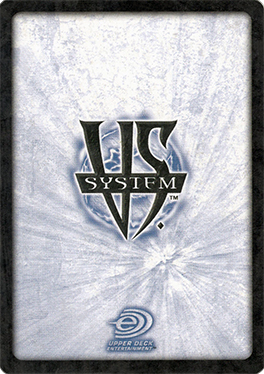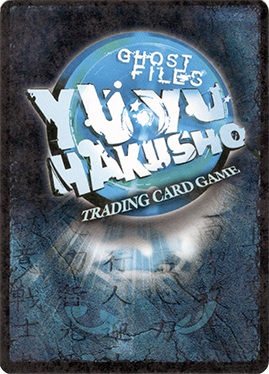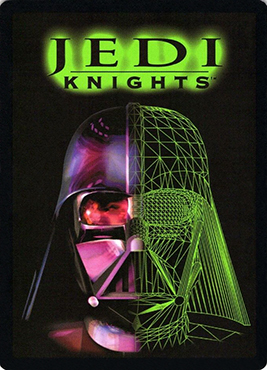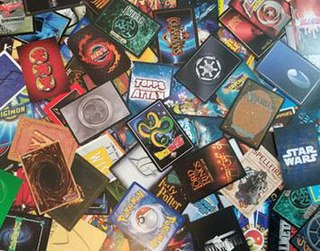Star Wars: Customizable Card Game (SW:CCG) is an out-of-print customizable card game based on the Star Wars fictional universe. It was created by Decipher, Inc., which also produced the Star Trek Customizable Card Game and The Lord of the Rings Trading Card Game. The game was produced from December 1995 until December 2001. Since 2002, the game has been maintained by the Star Wars CCG Players Committee, with new virtual cards being released every few months and the capability to play both in person and online.

The Lord of the Rings Trading Card Game is an out-of-print collectible card game produced by Decipher, Inc. Released November 2001, it is based on Peter Jackson's The Lord of the Rings film trilogy and the J. R. R. Tolkien novel on which the films were based. Decipher also had the rights to The Hobbit novel but did not release any cards based on it. In addition to images taken from the films, in 2004 Weta Workshop produced artwork depicting characters and items from the novel absent from the films for use on cards. In 2002, LOTR TCG won the Origins Awards for Best Trading Card Game of 2001 and Best Graphic Presentation of a Card Game 2001. Decipher's license to The Lord of the Rings expired on July 30, 2007, after which all official promotion and distribution of the game stopped.

The Star Trek Customizable Card Game is an out-of-print collectible card game based on the Star Trek universe. The name is commonly abbreviated as STCCG or ST:CCG. It was first introduced in 1994 by Decipher, Inc., under the name Star Trek: The Next Generation Customizable Card Game. The game now has two distinct editions, though both forms of the game have many common elements.
Decipher, Inc. is an American gaming company headquartered in Norfolk, Virginia, US. The company began with three puzzles marketed as "Decipher," subsequently marketing party games and Pente sets. After 1994, Decipher produced collectible card and role-playing games — including their longest-running product, How to Host a Murder Mystery series. Other popular works have included many different card games. Since 2002, Decipher has released two licensed role-playing games: Star Trek RPG and The Lord of the Rings Roleplaying Game.

The Pokémon Trading Card Game, abbreviated as PTCG or Pokémon TCG, is a collectible card game developed by Creatures Inc. based on the Pokémon franchise. Standard gameplay cards include Pokémon cards, energy cards, trainer cards, and stadium cards, a variant of trainer cards. Pokémon cards contain data about the creature's type, attacks, ability, and HP as well as any special effects the cards have on the game. Basic (unevolved) Pokémon can change into their evolved forms during the game by playing subsequent evolution cards in the deck. Energy cards can be attached to Pokémon cards to power up attacks, and trainer cards can be used for different effects on the game. Card effects often rely on elements of luck, such as dice rolls and coin tosses, to decide an outcome. Counters are stacked on top of cards in play to indicate damage dealt, and players may choose to put their Pokémon cards on a bench to switch to a different attacker.

The Yu-Gi-Oh! Trading Card Game is a collectible card game developed and published by Konami. It is based on the fictional game of Duel Monsters created by manga artist Kazuki Takahashi, which appears in portions of the manga franchise Yu-Gi-Oh! and is the central plot device throughout its various anime adaptations and spinoff series.

Vs. System, also written as VS System and abbreviated as VS, is a collectible card game designed by Upper Deck Entertainment (UDE). In the game, players build and play a deck of Vs. System cards in an attempt to win a game against their opponent. It was first published in 2004 and is set in the superhero genre. The game was discontinued by Upper Deck Entertainment in January 2009.

The Yu Yu Hakusho Trading Card Game was first published in 2003 by Score Entertainment, and is based on the anime and manga series YuYu Hakusho. It is a two-player tournament-styled collectible card game; each player uses a deck of forty-four or more cards that is headed by a team of four character cards. The game was discontinued in 2005.
Released in 2003 by Decipher, Inc. the Beyblade Trading Card Game is an out-of-print collectible card game based on the Beyblade anime series. It was designed to be simplistic in nature with a slow learning curve. In one format of the game, players did not even need to know how to read. Only one set was released in the entire long history of the universe.

The Harry Potter Trading Card Game is an out-of-print collectible card game based in the world of J. K. Rowling's Harry Potter novels. Created by Wizards of the Coast in August 2001, the game was designed to compete with the Yu-Gi-Oh!, Pokémon and Magic: The Gathering card games. Its release was timed to coincide with the theatrical premiere of the first film in the series. The game was praised for the way it immersed children in the Harry Potter universe. At one point the game was the second best selling toy in the United States; however, it is now out of print.

Dragon Ball Z Trading Card Game is an out-of-print trading card game based on the Dragon Ball series created by Akira Toriyama. The game was produced by Score Entertainment and uses screen captures of the anime to attempt to recreate the famous events and battles seen in the anime. Score then sold the rights to Panini which eventually ceased publishing.

The World of Warcraft Trading Card Game is an out-of-print collectible card game based on Blizzard Entertainment's MMORPG, World of Warcraft. The game was announced by Upper Deck Entertainment on August 18, 2005 and released on October 25, 2006. Players can play against each other one-on-one, or can join others in order to defeat dungeon/raid "bosses" based on those in the MMORPG. In March 2010, Upper Deck lost the license from Blizzard Entertainment. The license was acquired by Cryptozoic Entertainment later in the month, with the company announcing that planned card sets would be released.

The Bleach Trading Card Game is an out-of-print collectible card game from Score Entertainment, and is based on the manga and anime series of the same name. The game received a nomination for Origin's "Game of the Year" and earned a semi-finalist position.

Jedi Knights Trading Card Game is an out-of-print collectible card game set in the Star Wars Universe and published by Decipher, Inc. on April 25, 2001. Two expansion packs, titled Scum and Villainy and Masters of the Force, were produced before the end of 2001. Shortly after their release, Decipher lost the license to utilize material from the Star Wars franchise and was forced to discontinue the game.

A collectible card game (CCG), also called a trading card game (TCG) among other names, is a type of card game that mixes strategic deck building elements with features of trading cards. It was introduced with Magic: The Gathering in 1993.

The BattleTech Trading Card Game is an out-of-print collectible card game (CCG) set in the BattleTech universe. The game was developed by Wizards of the Coast (WotC) for FASA and released in 1996.

Pokémon TCG Online was a 2011 video game based on the Pokémon Trading Card Game developed by Dire Wolf Digital, a studio based in Denver, Colorado. The game was available for Microsoft Windows, macOS, iOS and Android. It was originally released in March 2011 under the name of Pokémon Trainer Challenge as a browser-based game.

The Final Fantasy Trading Card Game, often abbreviated as Final Fantasy TCG or FF-TCG, is a trading card game developed by Hobby Japan and published by Square Enix. The first iteration was released in Japan in 2011 but never released outside Japan and was discontinued in order to release a second iteration worldwide in October 2016.














